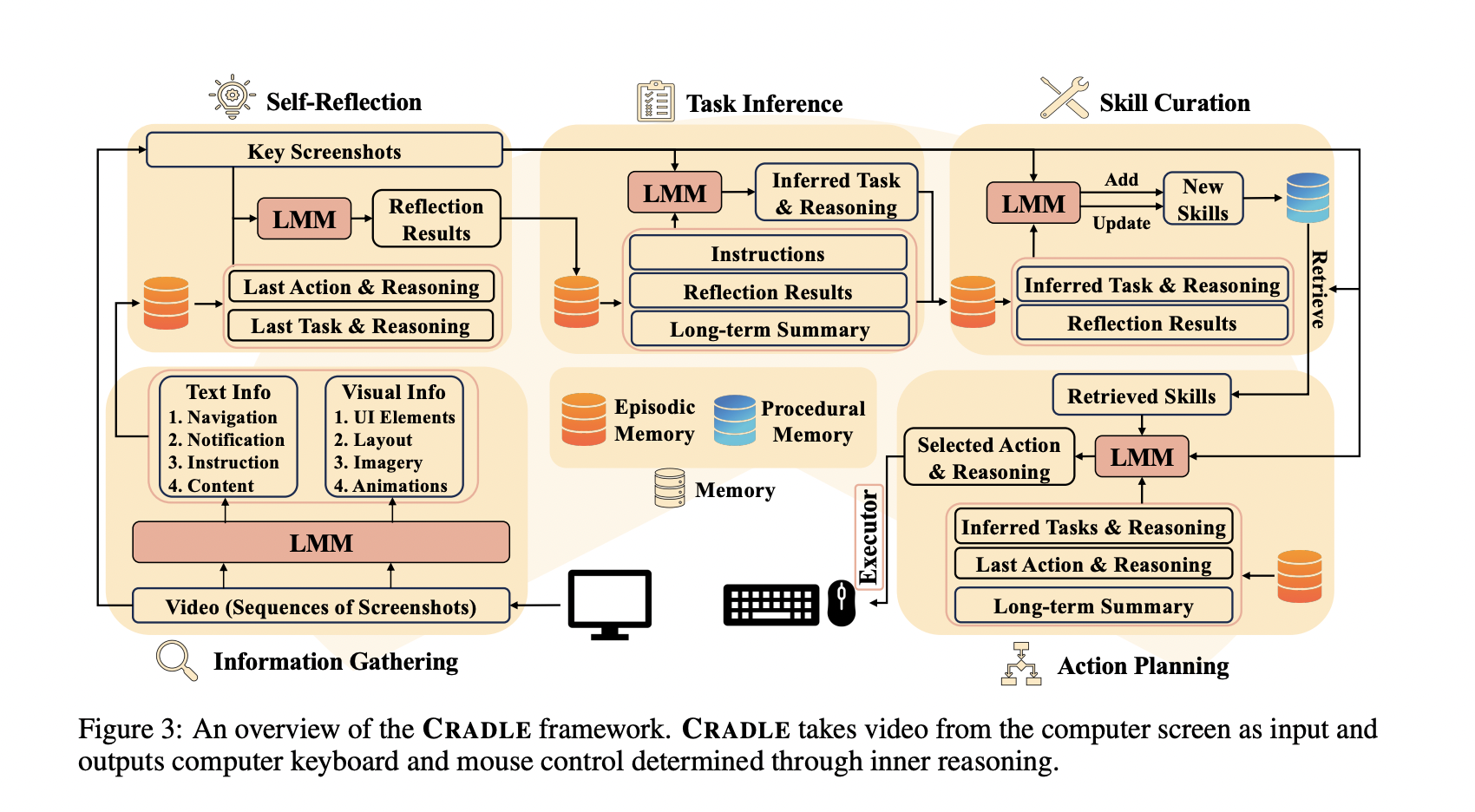Unlocking the Potential of General Computer Control with CRADLE: Steering Through Digital Challenges

In the quest to achieve Artificial General Intelligence (AGI), foundation agents have shown promise in handling complex scenarios and tasks by leveraging large multimodal models (LMMs) and advanced tools. However, these agents often stumble when faced with generalizing across different scenarios. This challenge stems primarily from the dramatic differences in observations and actions required across various settings. Researchers have proposed that the General Computer Control (GCC) setting be used to address this gap. This innovative approach aims to master any computer task by interpreting screen images (and possibly audio) and translating them into keyboard and mouse operations, mirroring human-computer interaction. The primary hurdles in realizing GCC include:
- Dealing with multimodal observations
- Ensuring precise control of keyboard and mouse
- Necessitating long-term memory and reasoning
- Fostering efficient exploration and self-improvement
The CRADLE framework (overview shown in Figure 3) emerges as a pioneering solution to these challenges. With its six main modules focusing on information gathering, self-reflection, task inference, skill curation, action planning, and memory, CRADLE demonstrates a novel way to understand and interact with digital environments. This framework’s deployment in the complex AAA game Red Dead Redemption II (shown in Figure 4) showcases its potential to navigate, learn, and perform in intricate virtual worlds without prior detailed knowledge of the game’s mechanics.
CRADLE’s information-gathering module processes screen images to extract relevant information, including both textual and visual data, enabling the framework to comprehend the current scenario and plan accordingly. The skill and action generation mechanism is particularly noteworthy. It translates in-game instructions into executable keyboard and mouse actions, allowing CRADLE to interact with the game in a nuanced and effective manner. This interaction is further refined through the reasoning modules, which evaluate the outcomes of actions and plan future moves based on the gathered information and past experiences.
Quantitative evaluations of CRADLE in Red Dead Redemption II reveal its capability to successfully complete a variety of tasks with minimal reliance on prior knowledge, marking a significant step towards achieving GCC. However, the implementation also uncovers limitations in spatial perception, icon understanding, and history processing, indicating areas for future improvement. Despite these challenges, CRADLE’s performance underscores the feasibility of LMM-based agents following and completing real missions in complex games, offering insights into developing more versatile and powerful agents for computer control tasks.
In conclusion, CRADLE represents a substantial advancement in the pursuit of AGI through the GCC setting. Its ability to adapt, learn, and interact with a wide range of computer tasks suggests a promising future where digital agents can seamlessly navigate and perform in the digital world. Future enhancements to CRADLE aim to broaden its application scope, improve multimodal input handling, and refine its decision-making processes, potentially revolutionizing how we approach AGI and digital interaction.
Check out the Paper. All credit for this research goes to the researchers of this project. Also, don’t forget to follow us on Twitter. Join our Telegram Channel, Discord Channel, and LinkedIn Group.
If you like our work, you will love our newsletter..
Don’t Forget to join our 38k+ ML SubReddit
![]()
Vineet Kumar is a consulting intern at MarktechPost. He is currently pursuing his BS from the Indian Institute of Technology(IIT), Kanpur. He is a Machine Learning enthusiast. He is passionate about research and the latest advancements in Deep Learning, Computer Vision, and related fields.



